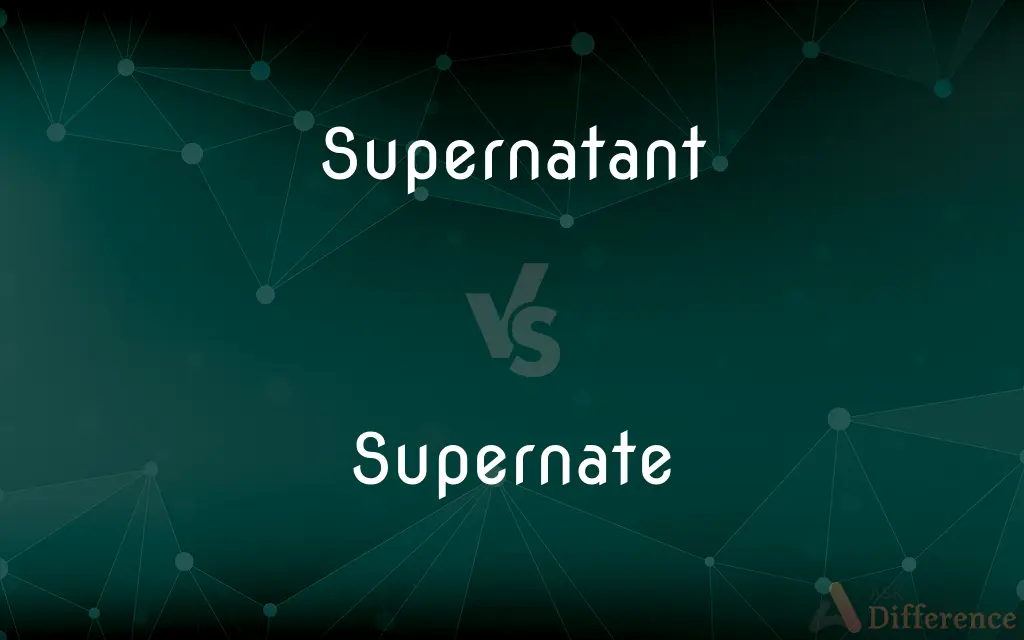Supernatant vs. Supernate — What's the Difference?
By Tayyaba Rehman & Fiza Rafique — Updated on March 21, 2024
Supernatant refers to the clear liquid lying above a solid or precipitate after sedimentation, while supernate is less commonly used but means the same.

Difference Between Supernatant and Supernate
Table of Contents
ADVERTISEMENT
Key Differences
Supernatant is a term widely used in chemistry and biology to describe the clear liquid that remains above the precipitate or sediment after centrifugation, settling, or any process that causes particles to deposit at the bottom of a container. This liquid can be carefully removed and used in further analysis or processes, being of particular interest in experiments or procedures where separating mixtures into their component parts is necessary. Supernate, though technically synonymous with supernatant, is less frequently used in scientific literature and discussions. Both terms originate from the process of sedimentation, where a mixture is left to stand until the solid particles settle at the bottom, leaving a clear liquid on top. Despite their shared meaning, the preference for "supernatant" in most contexts likely stems from its more widespread recognition and use among scientists.
In practical applications, whether in a laboratory setting or in industrial processes, the distinction between these terms is minimal, focusing more on the process and outcome of sedimentation or centrifugation rather than the terminology. The ability to separate and analyze the supernatant is crucial in many fields, such as biochemistry, environmental science, and medicine, for understanding the composition of mixtures, the behavior of substances in solution, and for purifying compounds.
While "supernatant" is the preferred term in most scientific documents and discussions, "supernate" serves as an alternative that is understood among professionals. Choosing between them might depend on personal or regional preferences, though "supernatant" is more likely to be recognized and used globally in scientific communications.
The use of either term reflects the ongoing processes in scientific research and industry where separating components of mixtures is essential. Whether referring to the liquid as supernatant or supernate, the focus remains on its significance in analysis, testing, and production processes across various scientific disciplines.
Comparison Chart
Definition
The clear liquid above a solid or precipitate after settling.
Same as supernatant, but less commonly used.
ADVERTISEMENT
Usage Frequency
Widely used in scientific literature and discussions.
Less frequently used, but understood in scientific contexts.
Context
Chemistry, biology, environmental science, medicine.
Same as supernatant.
Importance
Crucial for separating and analyzing mixtures.
Identical to supernatant in its scientific significance.
Preference
Preferred term due to wider recognition.
Considered an alternative to supernatant.
Compare with Definitions
Supernatant
Common in scientific research and industry.
The quality of the supernatant is crucial for accurate biochemical assays.
Supernate
Also describes clear liquid above sediment.
The supernate was clear, indicating no particulate contamination.
Supernatant
Results from centrifugation or settling.
After centrifugation, the supernatant can be easily pipetted off.
Supernate
Same sedimentation or centrifugation origin.
The supernate's quality is dependent on the centrifugation speed.
Supernatant
Describes the clear liquid remaining after sedimentation.
The supernatant was collected for further analysis.
Supernate
Understood but less common in texts and discussions.
In his report, he referred to the liquid as supernate.
Supernatant
Essential for understanding mixture components.
Analyzing the supernatant helps identify dissolved substances.
Supernate
Less frequently used, but recognized among professionals.
Some older scientific texts refer to the liquid as supernate.
Supernatant
Widely recognized and used in scientific communities.
Publications frequently discuss the properties of the supernatant.
Supernate
Similarly crucial for analytical and production processes.
The supernate contained the enzyme of interest.
Supernatant
Denoting the liquid lying above a solid residue after crystallization, precipitation, centrifugation, or other process
Carefully transfer the supernatant fluid into a 15 ml centrifuge tube
Supernate
Supernatant.
Supernatant
A volume of supernatant liquid
The supernatants were filtered and analysed
Supernate
Supernatant.
Supernatant
Floating on the surface.
Supernate
And without object. Of a liquid: to lie above and in contact with (a solid residue, other liquid, etc.).
Supernatant
The clear fluid above a sediment or precipitate.
Supernate
A supernatant liquid
Supernatant
Lying or floating above a denser fluid, or above a solid sediment or precipitate (which has been separated by crystallisation, centrifugation etc.).
Supernatant
The liquid that lies above a sediment or precipitate; supernate
Supernatant
Material that floats on the surface of a liquid
Supernatant
Swimming above; floating on the surface; as, oil supernatant on water.
Supernatant
The liquid remaining after solids suspended in the liquid have been sedimented by gravity or by centrifugation. Contrasted with the solid sediment, or (in centrifugation) the pellet.
Supernatant
A liquid lying above a sediment (floating on the surface)
Supernatant
Of a liquid; floating on the surface above a sediment or precipitate;
The supernatant fat was skimmed off
Common Curiosities
How does supernate differ from supernatant?
Supernate is synonymous with supernatant but is used less frequently in scientific discourse.
Why is supernatant important in scientific research?
The analysis of supernatant is vital for separating and understanding the components of mixtures in various scientific fields.
Can supernate be used interchangeably with supernatant?
Yes, though "supernatant" is the more commonly accepted and used term.
What is a supernatant?
A supernatant is the clear liquid that remains above a sediment or precipitate after centrifugation or settling.
How do you obtain a supernatant?
A supernatant is obtained by allowing a mixture to settle or by centrifugation, which causes solids to deposit at the bottom.
What role does supernatant play in environmental science?
In environmental science, supernatant analysis can help assess water quality and the presence of contaminants.
How is the term supernatant used in medicine?
In medicine, supernatant can refer to the clear liquid separated from blood or other bodily fluids for testing.
Is there a difference in the context where supernate and supernatant are used?
No, both terms are used in similar scientific contexts, although "supernatant" is more widespread.
Are there specific techniques for analyzing supernatant?
Yes, various analytical techniques such as spectroscopy or chromatography can be used to analyze supernatants.
Why might someone prefer to use "supernate" over "supernatant"?
Preference could be due to personal or regional linguistic habits, though "supernatant" is generally more recognized.
Can supernatant contain dissolved substances?
Yes, supernatant often contains dissolved substances that can be analyzed to determine their nature and concentration.
Is the study of supernatant important in biochemistry?
Yes, studying supernatant is crucial in biochemistry for enzyme assays, protein purification, and other analyses.
Can the quality of supernatant affect experimental results?
Absolutely, the purity and composition of supernatant can significantly influence the outcomes of scientific experiments.
How do you ensure the removal of supernatant without disturbing the sediment?
Careful pipetting and using a siphon can help remove supernatant without disturbing the underlying sediment.
What equipment is commonly used to separate supernatant?
Centrifuges are commonly used to separate supernatant from precipitate in laboratory settings.
Share Your Discovery

Previous Comparison
Infra vs. Supra
Next Comparison
Gavage vs. LavageAuthor Spotlight
Written by
Tayyaba RehmanTayyaba Rehman is a distinguished writer, currently serving as a primary contributor to askdifference.com. As a researcher in semantics and etymology, Tayyaba's passion for the complexity of languages and their distinctions has found a perfect home on the platform. Tayyaba delves into the intricacies of language, distinguishing between commonly confused words and phrases, thereby providing clarity for readers worldwide.
Co-written by
Fiza RafiqueFiza Rafique is a skilled content writer at AskDifference.com, where she meticulously refines and enhances written pieces. Drawing from her vast editorial expertise, Fiza ensures clarity, accuracy, and precision in every article. Passionate about language, she continually seeks to elevate the quality of content for readers worldwide.













































